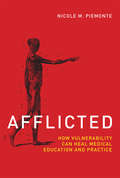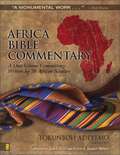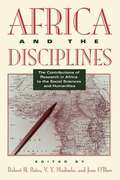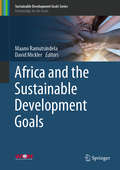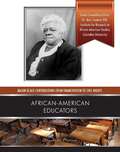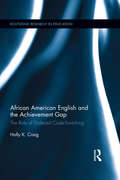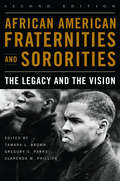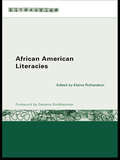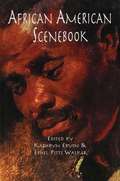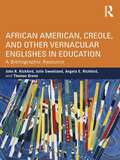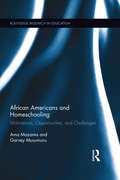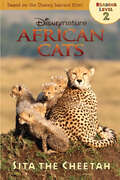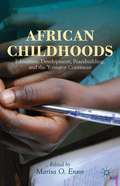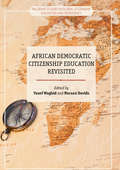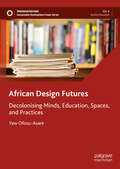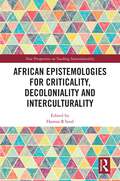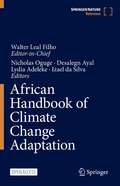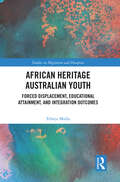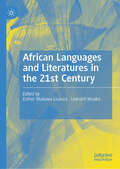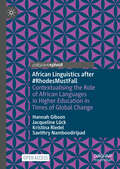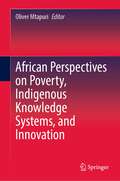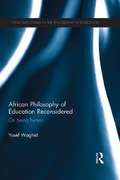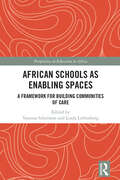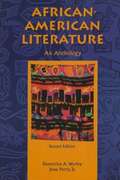- Table View
- List View
Afflicted: How Vulnerability Can Heal Medical Education and Practice (Basic Bioethics)
by Nicole M. PiemonteHow medical education and practice can move beyond a narrow focus on biological intervention to recognize the lived experiences of illness, suffering, and death.In Afflicted, Nicole Piemonte examines the preoccupation in medicine with cure over care, arguing that the traditional focus on biological intervention keeps medicine from addressing the complex realities of patient suffering. Although many have pointed to the lack of compassion and empathy in medical practice, few have considered the deeper philosophical, psychological, and ontological reasons for it. Piemonte fills that gap, examining why it is that clinicians and medical trainees largely evade issues of vulnerability and mortality and, doing so, offer patients compromised care. She argues that contemporary medical pedagogy and epistemology are not only shaped by the human tendency to flee from the reality of death and suffering but also perpetuate it. The root of the problem, she writes, is the educational and institutional culture that promotes reductionist understandings of care, illness, and suffering but avoids any authentic confrontation with human suffering and the fear and self-doubt that can come with that confrontation. Through a philosophical analysis of the patient-practitioner encounter, Piemonte argues that the doctor, in escaping from authentic engagement with a patient who is suffering, in fact “escapes from herself.”Piemonte explores the epistemology and pedagogy of medicine, examines its focus on calculative or technical thinking, and considers how “clinical detachment” diminishes physicians. She suggests ways that educators might cultivate the capacity for authentic patient care and proposes specific curricular changes to help students expand their moral imaginations.
Africa Bible Commentary: A One-Volume Commentary Written by 70 African Scholars
by ZondervanThe Africa Bible Commentary is a unique publishing event—the first one-volume Bible commentary produced in Africa by African theologians to meet the needs of African pastors, students, and lay leaders. Interpreting and applying the Bible in the light of African culture and realities, it furnishes powerful and relevant insights into the biblical text that transcend Africa in their significance. The Africa Bible Commentary gives a section-by-section interpretation that provides a contextual, readable, affordable, and immensely useful guide to the entire Bible. Readers around the world will benefit from and appreciate the commentary’s fresh insights and direct style that engage both heart and mind. Key features: · Produced by African biblical scholars, in Africa, for Africa—and for the world · Section-by-section interpretive commentary and application · More than 70 special articles dealing with topics of key importance in to ministry in Africa today, but that have global implications · 70 African contributors from both English- and French-speaking countries · Transcends the African context with insights into the biblical text and the Christian faith for readers worldwide
Africa and the Disciplines: The Contributions of Research in Africa to the Social Sciences And Humanities
by Robert H. Bates V. Y. Mudimbe Jean F. O'BarrAfrican Studies, contrary to some accounts, is not a separate continent in the world of American higher education. Its intellectual borders touch those of economics, literature, history, philosophy and art; its history is the story of the world, both ancient and modern. This is the clear conclusion of Africa and the Disciplines, a book that addresses the question: Why should Africa be studied in the American university?
Africa and the Sustainable Development Goals (Sustainable Development Goals Series)
by Maano Ramutsindela David MicklerThe book draws upon the expertise and international research collaborations forged by the Worldwide Universities Network Global Africa Group to critically engage with the intersection, in theory and practice, of the Sustainable Development Goals (SDGs) and Africa’s development agendas and needs. Further, it argues that – and demonstrates how – the SDGs should be understood as an aspirational blueprint for development with multiple meanings that are situated in dynamic and contested terrains. As the SDGs have substantial implications for development policy and resourcing at both the macro and micro levels, their relevance is not only context-specific but should also be assessed in terms of the aspirations and needs of ordinary citizens across the continent. Drawing on analyses and evidence from both the natural and social sciences, the book demonstrates that progress towards the SDGs must meet demands for improving human well-being under diverse and challenging socio-economic, political and environmental conditions. Examples include those from the mining industry, public health, employment and the media. In closing, it highlights how international collaboration in the form of research networks can enhance the production of critical knowledge on and engagement with the SDGs in Africa.
African American Educators (Major Black Contributions from Emancipat)
by Elizabeth MassieWithout education, it's very difficult to make the most of your talents and abilities. But for much of American history, black people couldn't get an education. In many places it was against the law for slaves to learn to read and write. Despite this, many brave slaves found a way to learn. Some taught themselves. Others sneaked to schools held late at night. Even after slavery was ended in 1865, African Americans continued to be treated unfairly. It was still a struggle for them to get an education. African-American educators stepped up to make a difference. They faced hardship. They often worked for very little pay--or for no pay at all. These educators built schools. They taught their students and stood up for equal rights. They proved that a person's race has nothing to do with his or her ability.
African American English and the Achievement Gap: The Role of Dialectal Code Switching (Routledge Research in Education)
by Holly K. CraigMany African American children make use of African American English (AAE) in their everyday lives, and face academic barriers when introduced to Standard American English (SAE) in the classroom. Research has shown that students who can adapt and use SAE for academic purposes demonstrate significantly better test scores than their less adaptable peers. Accordingly, AAE use and its confirmed inverse relationship to reading achievement have been implicated in the Black-White Test Score Gap, thus becoming the focus of intense research and practical interest. This volume discusses dialectal code-switching from AAE to SAE and stresses the benefits and importance of African American students becoming bi-dialectal. It provides background theory and science supporting the most promising educational approach to date, Contrastive Analysis, a set of longstanding methods drawn from Second Language research and used effectively with students ranging from kindergarten through college. It offers a deeper knowledge of AAE use by students, the critical features of Contrastive Analysis, and detailed information about successful applications which teachers can apply in their own pedagogy.
African American Fraternities and Sororities: The Legacy and the Vision
by Clarenda M. Phillips Gregory S. Parks Tamara L. BrownThe rich history and social significance of the “Divine Nine” African American Greek-letter organizations is explored in this comprehensive anthology.In the long tradition of African American benevolent and secret societies, intercollegiate African American fraternities and sororities have strong traditions of fostering brotherhood and sisterhood among their members, exerting considerable influence in the African American community and being in the forefront of civic action, community service, and philanthropy. Dr. Martin Luther King, Jr., Toni Morrison, Arthur Ashe, and Sarah Vaughn are just a few of the trailblazing members of these organizations.African American Fraternities and Sororities places the history of these organizations in context, linking them to other movements and organizations that predated them and tying their history to the Civil Rights movement. It explores various cultural aspects of the organizations, such as auxiliary groups, branding, calls, and stepping, and highlights the unique role of African American sororities.
African American Literacies (Literacies)
by Elaine RichardsonAfrican-American Literacies is a personal, public and political exploration of the problems faced by student writers from the African-American Vernacular English (AAVE) culture.Drawing on personal experience, Elaine Richardson provides a compelling account of the language and literacy practices of African-American students. The book analyses the problems encountered by the teachers of AAVE speakers, and offers African American centred theories and pedagogical methods of addressing these problems. Richardson builds on recent research to argue that teachers need not only to recognise the value and importance of African-American culture, but also to use African-American English when teaching AAVE speakers standard English.African-American Literacies offers a holistic and culturally relevant approach to literacy education, and is essential reading for anyone with an interest in the literacy practices of African-American students.
African American Scenebook (Source Books on Education #57)
by Ethel Pitts-Walker Kathryn ErvinFirst Published in 1999. Routledge is an imprint of Taylor & Francis, an informa company.
African American Studies Kennedy-King College
by Editors at the PearsonThis book on African American studies covers topics like : Black People in Colonial North America,The Meaning of Freedom: The Promise of Reconstruction,The Failure of Reconstruction,White Supremacy Triumphant,Black Nationalism, Black Power, Black Arts etc.
African American, Creole, and Other Vernacular Englishes in Education: A Bibliographic Resource (NCTE-Routledge Research Series)
by John R. Rickford Julie Sweetland Angela E. Rickford Thomas GranoMore than 50 years of scholarly attention to the intersection of language and education have resulted in a rich body of literature on the role of vernacular language varieties in the classroom. This field of work can be bewildering in its size and variety, drawing as it does on the diverse methods, theories, and research paradigms of fields such as sociolinguistics, applied linguistics, psychology, and education. Compiling most of the publications from the past half century that deal with this critical topic, this volume includes more than 1600 references (books, articles in journals or books, and web-accessible dissertations and other works) on education in relation to African American Vernacular English [AAVE], English-based pidgins and creoles, Latina/o English, Native American English, and other English vernaculars such as Appalachian English in the United States and Aboriginal English in Australia), with accompanying abstracts for approximately a third of them. This comprehensive bibliography provides a tool useful for those interested in the complex issue of how knowledge about language variation can be used to more effectively teach students who speak a nonstandard or stigmatized language variety.
African Americans and Homeschooling: Motivations, Opportunities and Challenges (Routledge Research in Education #125)
by Ama Mazama Garvey MusumunuDespite greater access to formal education, both disadvantaged and middle-class black students continue to struggle academically, causing a growing number of black parents to turn to homeschooling. This book is an in-depth exploration of the motivations behind black parents’ decision to educate their children at home and the strategies they’ve developed to overcome potential obstacles. Citing current issues such as culture, religion and safety, the book challenges the commonly expressed view that black parents and their children have divested from formal education by embracing homeschooling as a constructive strategy to provide black children with a valuable educational experience.
African Cats: Sita the Cheetah
by Disney PressInspired by the journey of the cheetahs in the Disney Nature film, African Cats: The Kingdom of Courage.
African Childhoods
by Marisa O. EnsorWith 70 per cent of its people under the age of 30, Africa is the world's youngest continent. African youngsters have been largely characterized as either vulnerable victims of the frequent humanitarian crises that plague their homelands, or as violent militarized youth and 'troubled' gang members. Young people's contributions to processes of educational provision, peace building and participatory human development in Africa are often ignored. While acknowledging the profound challenges associated with growing up in an environment of uncertainty and deprivation, African Childhoods sheds light on African children's often constructive engagement with a variety of societal conditions, adverse or otherwise, and their ability to positively influence their own lives and those of others.
African Democratic Citizenship Education Revisited (Palgrave Studies in Global Citizenship Education and Democracy)
by Nuraan Davids Yusef WaghidThis edited collection explores how democratic citizenship education manifests across the African continent. A recognition of rights and responsibilities coupled with an emphasis on deliberative engagement among citizens, while not uniquely African, provides ample evidence that the concept can most appropriately be realised in relation to its connectedness with experiences of people living on the continent. Focussing on a diverse collection of voices, the editors and authors examine countries that have an overwhelming allegiance to democratic citizenship education. In doing so, they acknowledge that this concept, enveloped by a certain Africanness, has the potential to manifest in practices across the African continent. By highlighting the success of democratic citizenship education, the diverse and varied contributions from across this vast continent address the malaise in its implementation in countries where autocratic rule prevails. This pioneering volume will be an invaluable resource for researchers and students working in the fields of education and sociology, particularly those with an interest in education policy, philosophy of education and global citizenship initiatives.
African Design Futures: Decolonising Minds, Education, Spaces, and Practices (Sustainable Development Goals Series)
by Yaw Ofosu-AsareThis book responds to the question "Is it time to reimagine design education in Africa and decolonise our creative future?" The proposed volume is designed to provide a source of inspiration to readers in imagining their own futures within fields of Creative industries such as performative art, architecture design, industrial design, media production, drawing and illustration, filmmaking, design, documentary, virtual reality, and others. With a focus on decolonising design education in Africa, this book will challenge the dominant capitalist narrative and centre on the needs of African communities. It will provide insights into the challenges and opportunities of decolonising design education and propose alternative models for design education that promote social and environmental sustainability, cultural preservation, and community empowerment. Collectively, the proposed book's accounts bring to life the career possibilities within a rapidly expanding global sector of creativity and innovation with immense cultural, social, political, and economic impact. By exploring new models of creative practice and education that centre on social impact, cultural relevance, and community empowerment, this book will inspire readers to think critically about their own futures in the Creative Industries in Africa.
African Epistemologies for Criticality, Decoloniality and Interculturality (New Perspectives on Teaching Interculturality)
by Hamza R'BoulThis book addresses the underrepresentation and, more importantly, the misrepresentation of African epistemologies and traditions of thought in making sense of, theorizing, and doing interculturality.Africa remains (probably) the most oppressed and silenced sphere throughout centuries of colonialism and contemporary coloniality. Therefore, such an anthology provides a platform for those insights that have substantial epistemic capacity to alter our taken‑for‑granted notions of what interculturality is and what it is about. While a number of works have charted the contributions of African epistemologies in advancing our understanding of our intercultural realities, this book argues that the processes of decoloniality through and within interculturality have never been about (under) (mis)representation per se, but about how the politics of representation can provide inaccurate, tokenistic, and false inclusion. This book aims to substantiate the notion that decoloniality and interculturality are mutually inclusive, to demonstrate the affordances of African epistemologies in advancing intercultural knowledge, and to support the need to make visible philosophical and power‑literate approaches to interculturality.This book will be essential reading for scholars and students interested in African philosophy, African epistemology, and, more broadly, interculturality and intercultural communication.
African Handbook of Climate Change Adaptation
by Nicholas Oguge Desalegn Ayal Lydia Adeleke Izael Da SilvaThis open access book discusses current thinking and presents the main issues and challenges associated with climate change in Africa. It introduces evidences from studies and projects which show how climate change adaptation is being - and may continue to be successfully implemented in African countries. Thanks to its scope and wide range of themes surrounding climate change, the ambition is that this book will be a lead publication on the topic, which may be regularly updated and hence capture further works.Climate change is a major global challenge. However, some geographical regions are more severly affected than others. One of these regions is the African continent. Due to a combination of unfavourable socio-economic and meteorological conditions, African countries are particularly vulnerable to climate change and its impacts. The recently released IPCC special report "Global Warming of 1.5º C" outlines the fact that keeping global warming by the level of 1.5º C is possible, but also suggested that an increase by 2º C could lead to crises with crops (agriculture fed by rain could drop by 50% in some African countries by 2020) and livestock production, could damage water supplies and pose an additonal threat to coastal areas. The 5th Assessment Report produced by IPCC predicts that wheat may disappear from Africa by 2080, and that maize— a staple—will fall significantly in southern Africa. Also, arid and semi-arid lands are likely to increase by up to 8%, with severe ramifications for livelihoods, poverty eradication and meeting the SDGs. Pursuing appropriate adaptation strategies is thus vital, in order to address the current and future challenges posed by a changing climate. It is against this background that the "African Handbook of Climate Change Adaptation" is being published. It contains papers prepared by scholars, representatives from social movements, practitioners and members of governmental agencies, undertaking research and/or executing climate change projects in Africa, and working with communities across the African continent. Encompassing over 100 contribtions from across Africa, it is the most comprehensive publication on climate change adaptation in Africa ever produced.
African Heritage Australian Youth: Forced Displacement, Educational Attainment, and Integration Outcomes (Studies in Migration and Diaspora)
by Tebeje MollaIn the last four decades, Australia has resettled thousands of African refugees. As a visibly different minoritised group, Black African youth are often represented as disengaged, dangerous, and undesirable. Even so, rarely are generative mechanisms that negatively affect the life-courses of the youth critically examined. Drawing on a wide range of theoretical resources, policy reviews, longitudinal statistical data, and in-depth interviews, this book reports on the educational attainment and integration outcomes of African heritage Australian youth from refugee backgrounds. The book also identifies intersectional factors of educational disadvantage, analyses equity provisions, and outlines policy ideas for improved educational attainment and integration of refugee youth. It is unique in its scope and focus and contributes to knowledge in African Australian studies.The book will appeal to researchers, postgraduate students, and policymakers interested in understanding the dynamics of refugee resettlement and integration.
African Languages and Literatures in the 21st Century
by Esther Mukewa Lisanza Leonard MuakaThis edited book examines the crucial role still played by African languages in pedagogy and literatures in the 21st century, generating insights into how they effectively serve cultural needs across the African continent and beyond. Boldly positioning African languages as key resources in the 21st century, chapters focus on themes such as language revolt by marginalized groups at grassroots level, the experience of American students learning African languages, female empowerment through the use of African languages in music, film and literary works, and immigration issues. The contributions are written by scholars of language, literature, education and linguistics, and the book will be of interest to students and scholars in these and related areas.
African Linguistics after #RhodesMustFall: Contextualising the Role of African Languages in Higher Education in Times of Global Change
by Hannah Gibson Jacqueline Lück Kristina Riedel Savithry NamboodiripadThis open access book explores the link between African languages, decolonisation and transformation. It has its origins in a survey of students and instructors at higher education institutions both inside and outside Africa, and takes as a starting point the 2015 student-led #RhodesMustFall movement which spread across universities in South Africa. Many of the questions being asked by #RhodesMustFall found parallels in ongoing discussions across in Europe and North America. This book presents findings from the survey, set against the broader backdrop of calls for decolonisation and transformation, drawing specifically on linguistics teaching, scholarship and research. The findings provide new insights into how African languages and linguistics are framed and engaged with, amidst decolonial struggles in higher education. This book will be relevant to readers with an interest in African languages, social justice, higher education, and decolonisation.
African Perspectives on Poverty, Indigenous Knowledge Systems, and Innovation
by Oliver MtapuriThis book examines the connections between poverty and innovation in Africa. Through case studies and theorizations from a distinctly African perspective, it stands in contrast to current theoretical works in the field, which remain very much rooted in Western-orientated thinking. The book investigates the application of methodologies which explain numerous African contexts in connection with issues of poverty and inequality. It reflects on comparative practices and praxes on the African continent, including commonplace traditions and practices in alleviating poverty, taken against a background of the failure of current prescriptions for poverty alleviation, such as the Structural Adjustment Programmes (SAPs) and the Poverty Reduction Strategy Papers (PRSP). There is a dire need for new practical perspectives which move Africa forward using its indigenous knowledge. Owing to a general lack of recorded African theories and methodologies on poverty, inequality and innovation, this book represents a pioneering corpus of African knowledge addressing poverty and inequality through local innovations. Adopting a transdisciplinary approach, it is relevant to students and scholars in development studies and economics, African studies, social studies, political history and political economy, climate studies, anthropology and geography.
African Philosophy of Education Reconsidered: On being human (New Directions In The Philosophy Of Education Ser.)
by Yusef WaghidMuch of the literature on the African philosophy of education juxtaposes two philosophical strands as mutually exclusive entities; traditional ethnophilosophy on the one hand, and �scientific� African philosophy on the other. While traditional ethnophilosophy is associated with the cultural artefacts, narratives, folklore and music of Africa�s peop
African Schools as Enabling Spaces: A Framework for Building Communities of Care (Perspectives on Education in Africa)
by Linda Liebenberg Vanessa SchermanUsing African schools as case studies, this book presents an implementation framework that can be used by schools internationally to drive social change and support their role as enabling spaces, allowing learners to thrive. Recognising the increase in demands, violent conflicts, lack of stability, and social strain prevalent within the current African school system, this book covers the challenges that negatively impact children's development by understanding and presenting a framework that ensures a holistic social and educational support system can be created for students. Featuring contributions from a broad range of leading scholars, the book ultimately addresses the critical need in academic and practice research for the importance of schools in building civil societies. Arguing for the importance of schools as places of stability, social inclusivity, and communities of care, this book will have direct relevance to academics, researchers, and post-graduate students in the field of education policy, international and comparative education and character education. Those working in school leadership, management and administration environments will also benefit from this volume.
African-American Literature: An Anthology
by Jr. Demetrice A. Worley Jesse Perry TribuneAfrican-American Literature is a well-rounded collection of over eighty classic and contemporary readings. Overviews, biographical profiles, post-reading discussion, and writing questions make this a highly instructive anthology for a wide range of students.
